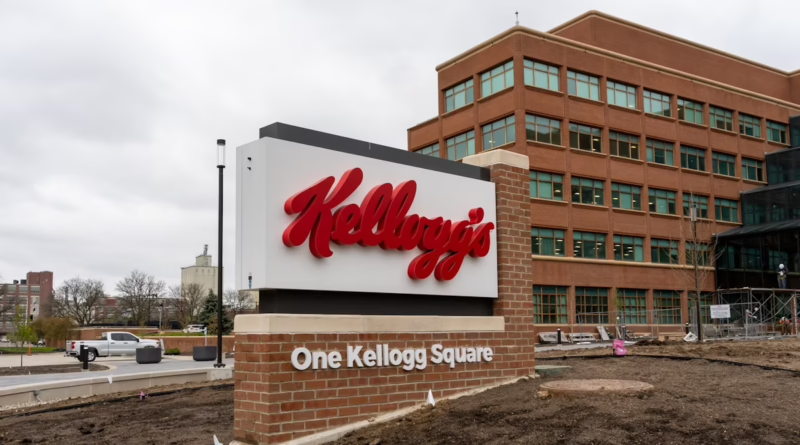History of Kellog’s in Battle Creek Michigan
Kellogg’s, headquartered in Battle Creek, Michigan, is a global leader in the food industry, renowned for its iconic breakfast cereals and a wide range of food products. Founded by W.K. Kellogg in the early 20th century, the company has grown from a small operation in a modest factory to a multinational corporation. This article explores the rich history of Kellogg’s, its innovative products, and its lasting impact on the global food market.
Early Beginnings and Foundation
The story of Kellogg’s begins in the late 19th century with the Kellogg brothers, Dr. John Harvey Kellogg and Will Keith (W.K.) Kellogg. Dr. John Harvey Kellogg was the superintendent of the Battle Creek Sanitarium, a health and wellness retreat that emphasized a vegetarian diet and holistic health practices. Inspired by the sanitarium’s philosophy, the Kellogg brothers experimented with creating healthy, ready-to-eat foods.
In 1894, they accidentally discovered the process of flaking cooked wheat, leading to the creation of wheat flakes, which they served to the sanitarium’s patients. This innovation marked the birth of cold breakfast cereals. However, it was W.K. Kellogg who saw the commercial potential of this discovery. In 1906, he founded the Battle Creek Toasted Corn Flake Company, later renamed Kellogg’s, to mass-produce and market his corn flakes.
Early Success and Expansion
Kellogg’s first product, Kellogg’s Toasted Corn Flakes, quickly gained popularity. W.K. Kellogg’s emphasis on quality and his innovative marketing strategies, including advertising and the use of distinctive packaging, helped establish the brand. By 1915, the company had expanded its product line to include Bran Flakes and All-Bran, further solidifying its presence in the breakfast cereal market.
The company’s growth was not without challenges. During World War I, Kellogg’s faced supply shortages and increased production costs. However, the company adapted by improving its manufacturing processes and maintaining a focus on product quality, ensuring its continued success.
Innovation and Product Diversification
The 1920s and 1930s were periods of significant innovation for Kellogg’s. The introduction of Rice Krispies in 1928 marked another milestone for the company. This product, famous for its “snap, crackle, pop” sound when milk is added, became a beloved breakfast staple. During this time, Kellogg’s also expanded its operations internationally, establishing plants in Canada and the United Kingdom.
Kellogg’s continued to innovate and diversify its product range throughout the mid-20th century. The introduction of products like Frosted Flakes, Corn Pops, and Special K reflected the company’s ability to adapt to changing consumer preferences. The acquisition of other food companies also allowed Kellogg’s to expand into new categories, including snacks, convenience foods, and frozen foods.
Marketing and Brand Building
Effective marketing has been a cornerstone of Kellogg’s success. The company pioneered the use of animated characters in advertising, with Tony the Tiger and Snap, Crackle, and Pop becoming iconic figures in popular culture. Kellogg’s also leveraged television advertising to reach a broader audience, sponsoring popular children’s shows and creating memorable commercials.
In addition to traditional advertising, Kellogg’s has been involved in numerous community and charitable initiatives. The company’s commitment to promoting health and nutrition is evident in its support for breakfast programs in schools and partnerships with organizations dedicated to fighting hunger.
Challenges and Adaptations
Like all major corporations, Kellogg’s has faced its share of challenges. The rise of health-conscious consumers in the late 20th and early 21st centuries prompted the company to reformulate many of its products to reduce sugar and incorporate whole grains. The competitive nature of the food industry and changing consumer tastes have required Kellogg’s to continually innovate and adapt.
Economic downturns and fluctuations in commodity prices have also impacted Kellogg’s operations. However, the company’s strategic acquisitions, such as the purchase of Pringles in 2012, have helped it maintain its market position and diversify its product offerings.
Sustainability and Corporate Responsibility
In recent years, Kellogg’s has placed a strong emphasis on sustainability and corporate responsibility. The company has implemented initiatives to reduce its environmental impact, including efforts to reduce greenhouse gas emissions, conserve water, and minimize waste. Kellogg’s has also committed to sustainable sourcing practices, ensuring that key ingredients like palm oil and cocoa are sourced responsibly.
The company’s social responsibility initiatives extend to supporting farmers and communities. Kellogg’s works with smallholder farmers to improve agricultural practices and increase yields, contributing to economic development in rural areas.
The Future of Kellogg’s
As Kellogg’s moves forward, it continues to focus on innovation, sustainability, and meeting the evolving needs of consumers. The company is investing in research and development to create new products that align with modern dietary preferences, such as plant-based and protein-rich foods. Kellogg’s commitment to digital transformation and e-commerce also positions it well for future growth in an increasingly connected world.
Conclusion
The history of Kellogg’s is a testament to the power of innovation, quality, and effective marketing. From its humble beginnings in Battle Creek, Michigan, to its status as a global food industry leader, Kellogg’s has remained true to its mission of providing nutritious and delicious products to consumers around the world. As the company continues to evolve, it is well-positioned to build on its legacy and achieve new milestones in the years to come.
Discover more from City Towner
Subscribe to get the latest posts sent to your email.




